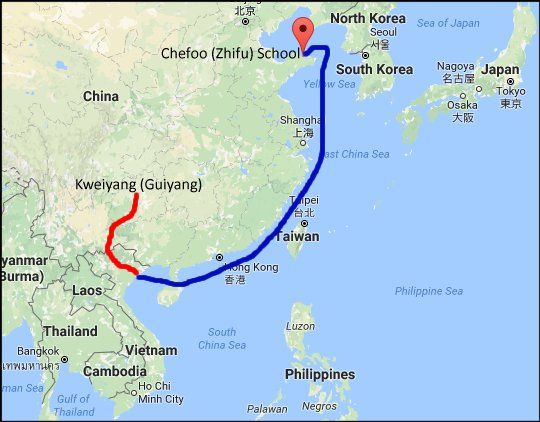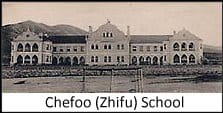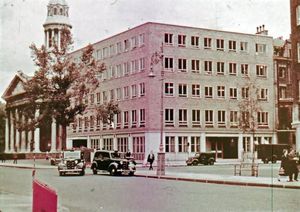In 1957 David Michell was appointed ‘House Chairman’ at London Bible College a position something like Head Boy at a school. To all appearances just a stable and mature Christian, able to take on this position of trust. However, what most of his peers did not know was the surprising story of what had happened to this young man in his earlier life, or the extraordinary way that his future would subsequently unfold.
David Michell was born in China in 1933. His parents were missionaries working with the China Inland Mission, now known as the Overseas Missionary Fellowship, missionary work in China having been stopped once the Communists took power. At the time that our story begins the family was living and working in Kweiyang, the capital city of Kweichow Province in southwest China, and David had reached the age of six.
This meant it was time for him to begin school. Like many other children of missionary parents this meant boarding school and an extended period away from his parents. Neither he nor his parents realised for how long and how difficult the circumstances were going to be.
The school to which David was sent was Chefoo School. This School began due to the influence of Hudson Taylor. In 1879 Hudson Taylor, the founder of the China Inland Mission had spent a heavy year preaching and travelling. Ill and exhausted he came to the northeast coast of China at Chefoo to rest and his health began to improve rapidly. ‘One afternoon as he walked on the beach with Mr and Mrs Charles Judd, whose children were already of school age, the thought came to him how very suitable the gently sloping fields right ahead of him would be for a school for missionaries’ children. Moreover it could serve as a haven where tired-out missionaries could rest.
What happened next would have been a surprise to anyone without the childlike faith of Hudson Taylor. Moments later a local farmer walked up to them and offered his bean field for sale. Taylor had no doubts now – God was showing them his purpose. In a short time a number of adjoining fields … were also purchased. And God provided the timber, furnishings and fittings for the Chefoo School from two shipwrecks. Thus the CIM Protestant Collegiate School opened in 1881.’ In 1939 there were really three schools there; the Girls School, the Preparatory School and the Boys School. As I understand it, the Girls School took all ages, while the younger boys went to the Prep School and then on to the Boys School, following the Public School pattern in Britain. The sixth form took the Oxford matriculation exams every summer. In due time Chefoo School become well known; it was looked upon as one of the best British schools located outside of Britain itself. Consular staff and others in China, including Americans, were glad to send their children to Chefoo.
To get to Chefoo David had to leave on a journey of about 3000 miles that would take at least six weeks, first by truck, then by train south and over the border into what is now Vietnam, but was then Indo-China; finally a long voyage by ship up the coast.

He records the start of his journey like this:
‘As we took off with a lurch, I leaned forward, my eyes glued to the misting image of my family fading away into the distance. Tears welled up and spilled down my cheeks, falling on to the goodbye present I was clutching.’
And here he is arriving at the school:
‘In tow of our missionary escorts we began to climb the wide steps up to the front doors. Two teachers with arms outstretched were coming towards us to welcome us. Suddenly the significance of what was happening swept over me. A surge of homesickness and pent-up resistance to the separation welled up inside. I took my stand on the steps, and I cried and cried. I turned to go back, but home was now two thousand miles and a six-week journey away. The more teachers coaxed and tried to guide me towards the door, the more I struggled to pull away. Eventually escorts and teachers won the day, and I was inside, unbloodied and uncowed.’
He had an older sister in the girl’s school, but she was ill in the sick bay when he arrived, and when he went to see her she was fast asleep. Mercifully, it seems that he nevertheless settled down reasonably quickly.

As 1939 passed into 1940 not only had Britain declared war on Nazi Germany but fighting between the Japanese and Chinese had intensified in the area in which Chefoo was located. In October 1940 a letter was sent to all parents outlining the situation but saying that the school was going to remain open for the time being. This may have been partly because to try and get the children out and sent to their families through all the turmoil around them seemed the more dangerous option. It also meant that the children were not able to get home for any holidays.
However, everything changed, suddenly and drastically, on Sunday December 7th 1941 when the Japanese launched their attack on the United States fleet in Pearl Harbour, bringing them into the war on the side of Nazis, and equally, bringing the United States into the war as allies of the British and Russians. The next day a Japanese military truck arrived at the main gate of Chefoo school and the soldiers demanded to see the Principal. He was taken off for interrogation and imprisoned for a whole month, though he was given a day pass to return for Christmas Day.
Taken from the notes of a fraternal paper by Paul E. Brown
Part 2 is here.










